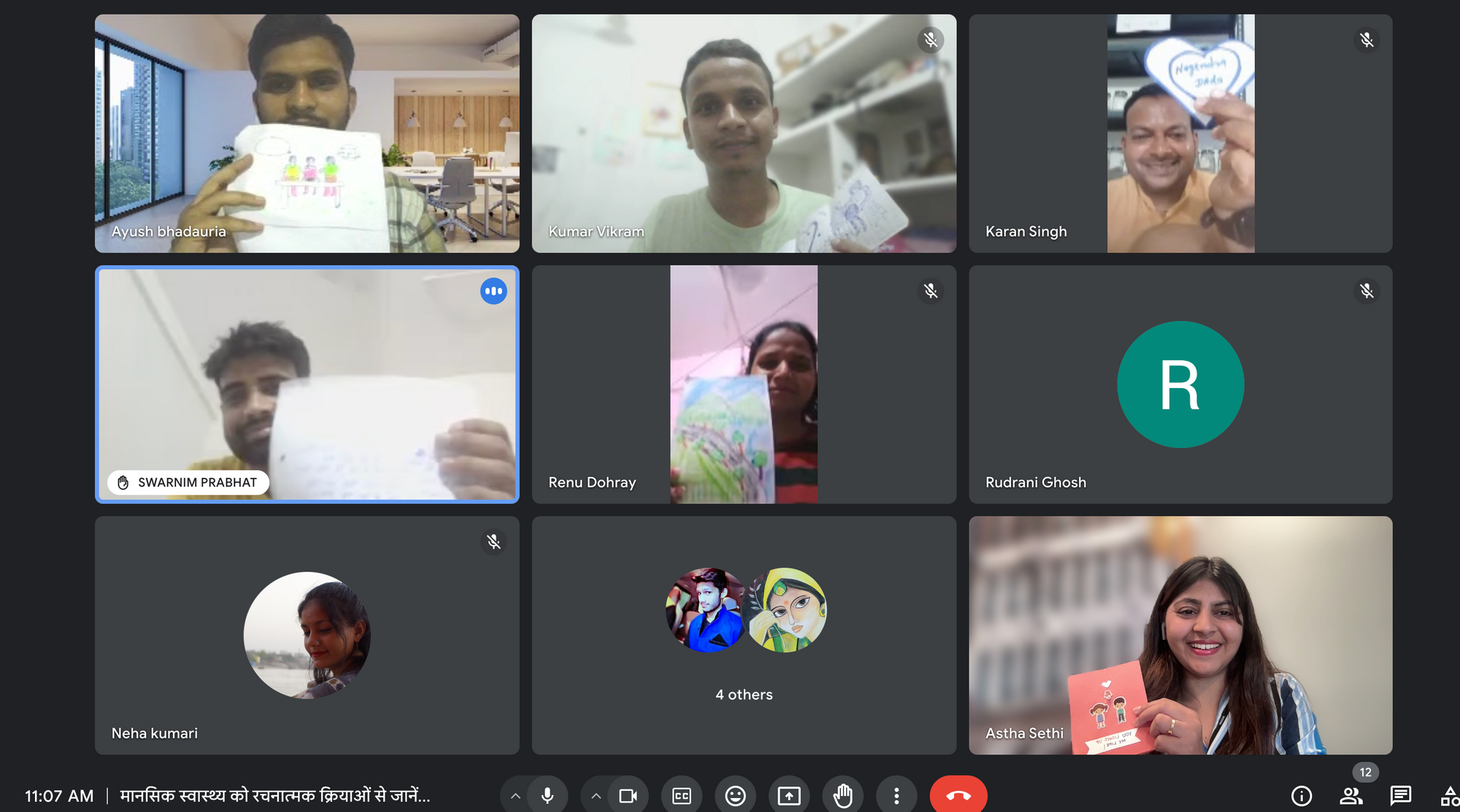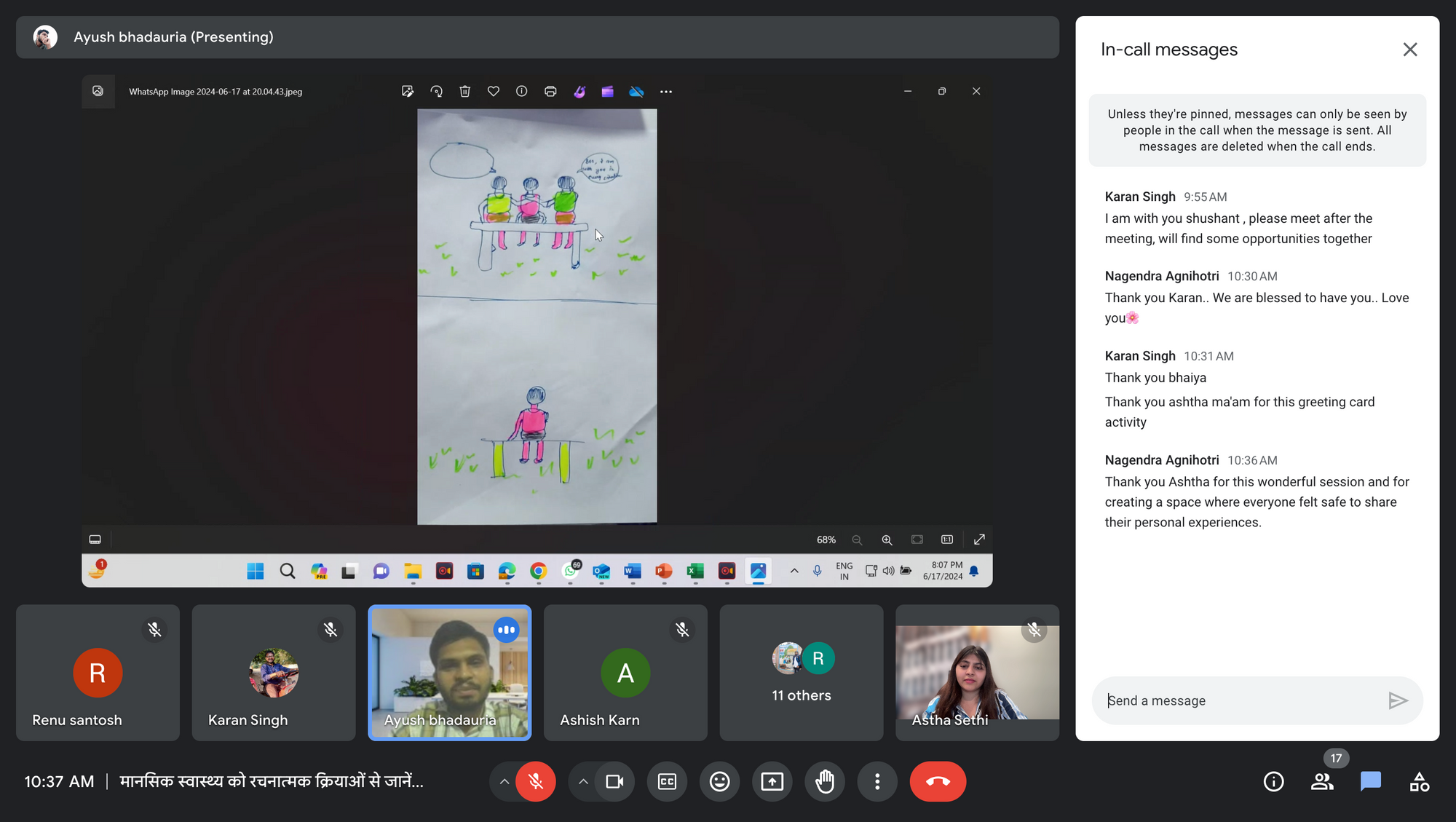Last month, in collaboration with the wonderful team at Tarang Manch, we hosted a virtual, hands-on workshop at the intersection of mental wellbeing and creativity. Tarang Manch is a small, education-focused organization with a similar pandemic origin story. They have been working in the Shahjahanpur district of Uttar Pradesh, India, for nearly four years with underprivileged children in the area, many of whom are forced to work in the local peanut factories for daily wages. Despite these peanut factories providing employment to local people, they also contribute to child labor, which is a significant reason for children dropping out of school. Consequently, the majority of the youth in this area do not pursue higher education. As a result, the area faces issues such as child labor, sexual abuse, domestic violence, and substance dependency, highlighting the urgent need for mental health and wellbeing support.
Organizing a workshop on the intersection of mental wellbeing and creativity was a new experience for us. We were delighted when Karan, the founder of Tarang Manch, approached us to conduct this workshop. Mental health remains a significant taboo in many parts of India, and addressing it in an educational setting poses its own challenges. Initially unsure how to proceed, we thought of Astha Sethi, a recent graduate from Parsons School of Design in the US and a friend of our studio, who specializes in mental wellbeing training through creative approaches. Fortunately, she also had experience facilitating similar workshops with elderly individuals in New York.
Even with an experienced facilitator on hand, we were still nervous. We knew a workshop with participants from a remote district would be a different experience altogether. To our amazement and delight, the participants were not only receptive but also openly interacted and communicated. One key measure of our workshop's success is the number of questions participants ask. We were pleased to note that they had many, whether agreeing with us, challenging us, or simply inquiring about various topics.
In this workshop, we were delighted to have educators from various schools in the region, including some Gandhi fellows, join us as participants from Saharanpur. Our workshop began with Astha giving a brief talk on why it is important to prioritize mental well-being and open up about our struggles with others. The highlight of the session was crafting personalized greeting cards. Participants were encouraged to design a card for someone they know well who's going through a tough time to show solidarity and support for them. For those without a specific person in mind, creating a self-care card was also an option. The idea behind an activity like this is to give the participants a tool for self-expression and create a safe space for them to talk about their experiences. We intentionally chose a simpler activity to avoid overwhelming them since this was our first interaction.
We started off slow but soon picked up pace as participants began opening up one by one. What started off as a simple creative exercise transformed, thanks to Astha’s expert facilitation and the participant’s enthusiasm, into a platform for them to share their troubles and joys.


Several participants expressed concerns about lacking motivation, a feeling many of us can relate to. They wanted to understand how they could make their lives, both personal and professional, more fruitful. Managing their own emotions also became an important topic of discussion. Participants talked about how to manage negative emotions like anger or sadness. Interesting answers came from the participants themselves, such as not becoming too negative when feeling demotivated but continuing to do small tasks to integrate a sense of achievement in oneself. Another suggestion was to take deep breaths and start counting from 1 to 100 in your mind when feeling angry.
The session was peaceful and creative, with activities like making greeting cards helping participants feel connected. Although people in our area are often not vocal, the well-designed session provided a safe space for everyone to communicate their emotions and share their stories easily.
– Karan Singh, Founder, Tarang Manch
We could not have foreseen that this workshop would create such an open and interactive platform. Initially, we assumed we needed to tread carefully due to the taboo surrounding mental health in India. However, the participants’ openness and curiosity proved us wrong. This experience demonstrates that creativity can become a powerful tool for emotional well-being, providing a much-needed outlet for expression and support.
